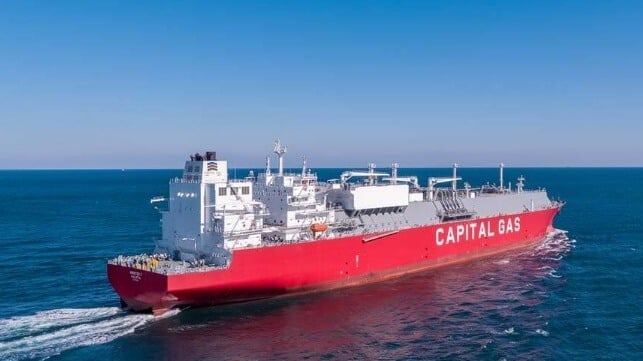Feasibility Studies Demonstrate Progress in Methane Abatement Technologies

Researchers are continuing to report strong progress in the efforts to reduce and eliminate methane slip (emissions of unburnt methane). The Methane Abatement in Maritime Innovation Initiative (MAMII), part of the Safetytech Accelerator established by Lloyd’s Register announced the results of four recently completed technology feasibility studies, reporting the outcomes showed strong potential to cut methane emissions in the maritime industry.
MAMI reports the technologies of four companies, Daphne Technology, CDTi Advanced Materials, Rotoboost, and Plenesys, were selected from among 20 proposals in the call for technologies to mitigate methane emissions from the exhaust stacks of LNG-fueled ships. Scientists and environmentalists are focused on methane emissions reporting that they are more harmful to the environment than other forms of the so-called greenhouse gases.
Three shipping companies, Capital Gas Ship Management, MSC Mediterranean Shipping Company, and Seapeak, joined from within the 20 companies that are members of MAMII. The shipping companies collaborated in the study helping with the development of commercially viable applications of the technologies.
“The feasibility studies for CH4 technologies represent a critical step towards reducing our environmental footprint and underscore our resolve to contribute positively to the maritime industry’s sustainability goals,” said Alexandra Xystra, Technical Manager, Capital Gas Ship Management.
The four companies presented different approaches to the challenges of methane abatement but all reported strong results. According to MAMII, the studies assumed efficiencies reaching 78 to 85 percent and also presented new ways of dealing with methane converting it to alternatives that could be redeployed to enhance economic efficiency for the operators.
“Information about how methane combustion performs under different conditions will be critical to solving the challenge of methane slip,” explained Bud Darr, MSC Group, Executive Vice President, Maritime Policy & Government Affairs. “Research insights from studies such as this one get the industry a step closer to understanding not only combustion performance but also what combination of onboard technologies can deliver significant methane emissions reduction.”
Daphne Technology focused on its implementation in the auxiliary engines of a dual-fuel 14,000 TEU containership. MAMII reports it showed that a two-unit installation, can cover four auxiliary engines, ensuring operational flexibility and providing an assumed removal efficiency of 85 percent. This study outlined a potential reduction of up to 440 metric tons of methane annually.
CDTI investigated its catalyst’s performance to demonstrate that it could offer increased methane conversion at lower temperatures and across various engine loads. The catalyst achieved 80 percent methane conversion.
The feasibility study conducted by Plenesys examined process compatibility and mechanical and electrical adaptations. It also included a techno-economic and environmental assessment of the technology deployment. The study demonstrated that the solution can effectively reduce methane slip by 78 percent, converting it to hydrogen for engine reinjection.
Rotoboost explored the implementation of its Thermo-Catalytic Decomposition system on LNG-fueled vessels. TCD system not only reduces methane slip by improving combustion efficiency but also lowers CO2 emissions due to the higher calorific value of the hydrogen-enhanced fuel mix. The study concluded that the hydrogen drop-in fuel generated by the onboard system presents several benefits such as significant emission reductions and additional revenue from carbon by-products.

that matters most
Get the latest maritime news delivered to your inbox daily.
“These technologies represent a significant stride towards mitigating methane emissions in the maritime industry, contributing to a sustainable and cleaner future for our oceans and the planet,” commented Nadia Echchihab, Head of Innovation Programmes for Safetytech Accelerator.
MAMII hopes to progress these research projects to on-ship trials as soon as possible. MAMII was launched in September 2022 by Safetytech Accelerator to bring together industry leaders, technology innovators, and maritime stakeholders to advance technologies for measuring and mitigating methane emissions in the maritime sector. The goal is to promote the adoption of validated solutions.
